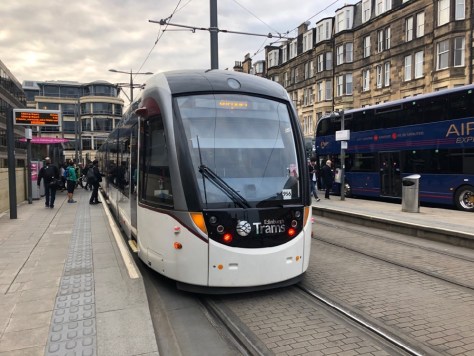
We spent Saturday visiting Longleat Safari Park and the weather was great. However on Monday I was, as a result of a last minute change, off to London, I had intended to catch the train, but due to problems with our online travel system (affecting just me it appears) meant that in the end I drove to London.
My diary that day included a relatively early morning conference call. So I stopped at the services, and with only a minute to spare, missed getting coffee and I took the call sitting in my car over 4G. The connection was pretty good and the video I was getting was quite high quality so all was well. I was quite pleased not to have to do the call on the train, as previous experience has shown that generally it works, but too many tunnels and blackspots means that participating in a conference call (especially with video) can be problematic and a bit of a nightmare. I rarely drive to London, usually I take the train, so I parked in West London and took the tube to the office, just in time for my second conference call.

I was in London to meet with the Consultant who had undertaken the University of Hertfordshire Value Study back in May prior to a presentation later in the week.
Tuesday I was off to our office in Bristol. I had no meetings, but my colleague Lawrie was down in Bristol so it was a good chance to catch up and see what was happening in his area.
He is organising an event at Keele, I was intending to attend the event, alas I now have to be in London on that date.
This one day event will explore the use of Microsoft Teams to support learning and teaching practices in universities, and the ways in which students want to communicate, collaborate and learn in a modern university.
He also blogged some early thoughts on his blog.
Published on the Jisc website was a podcast I was involved with which I spoke about in a previous weeknote.
What the Edtech?! Series two, episode two: process improvement – people before technology
In the podcast, John Cartwright, director of computing services at the University of Liverpool, talks about how his team are improving the student experience and saving staff time with technology. In the episode we explore the world of data, looking at how better use of it can transform teaching and power technologies like machine learning and artificial intelligence.
However the key message I wanted people to take from the discussion is that, transformation is about people first.

Wednesday I was presenting in front of the Jisc Board on Education 4.0 and what universities and colleges need to do to start down the road to the vision which is Education 4.0. Is say presenting the majority of the session was an activity discussing the issues and themes of Education 4.0.
As with the podcast the key feedback from the Board was the importance of the human element when it comes transformation.
I think the challenge we face in preparing for a roadmap, is the expectation that the roadmap delivered will be complete. If we knew what was needed and what was going to happen, then I suspect we would either a) already have a roadmap or b) not need one! So the first phase for the roadmap is researching and developing the roadmap. I did think should we even be using the term “roadmap”?
Thursday I spent some time reading the Advance HE report, On the Horizon.
This report focuses on the perceptions of change and challenge for the learning and teaching agenda in higher education (HE) providers around the world over the next five to ten years. A selection of people with executive or senior leadership roles in both the UK and overseas were interviewed about the challenges their institutions faced.
There was one section on evidence of effective practice, which reminded me of a blog post I wrote a couple of years ago.
In the report it states there is a lukewarm enthusiasm for change in teaching practices.
This is something we covered on the Jisc Digital Leaders Programme about change.
Part of the challenge, according to the report, is a lack of interest.
Some colleagues express worry about a general lack of interest in pedagogy from academics more comfortable with the established practices of their particular discipline.
But others show a definitive lack of faith in the evidence, because it is often based on small-sample studies.
Others wonder whether the quality of such research really matches up to the high standards expected elsewhere, not least because the research findings often derive from small-sample studies.
However all is not lost…
Many think there are real opportunities now for a step-change in pedagogy and improved student learning: ‘it’s time to start thinking much more seriously about the collective will for real pedagogical innovation and how it can be sustained.’
Friday I had a couple of online meetings and spent a fair amount of time developing the assessment criteria for one of our Technical Career Pathway paths.
My top tweet this week was this one.
Lemur @longleatofficial @longleat #longleat #longleatsafaripark #longleatsafari #lemur https://t.co/HYNo4XLIYe pic.twitter.com/hPdSw8YlQp
— James Clay (@jamesclay) September 25, 2019











































